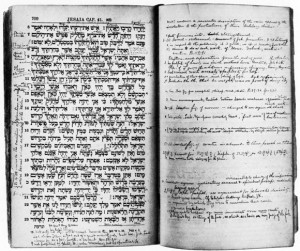History of Jewish Studies at Chicago
Advanced education and scholarship in Jewish Studies have been an integral part of the University of Chicago since its founding in 1891. William Rainey Harper, the first president of the University, was a distinguished scholar of the Hebrew Bible, and the first faculty included Emil Gustav Hirsch, a scholar of Rabbinics and classical Hebrew literature. The Oriental Institute, founded in 1919, is one of the foremost interdisciplinary research centers in the world for the study of ancient and medieval Near Eastern language, civilization, and archeology, including Palestine and Ancient Israel.

William Rainey Harper's copy of the Hebrew Bible, University of Chicago Library
Over the last several decades, there has been unprecedented growth both in numbers of faculty, areas of specialization, and numbers of graduate students engaged in Jewish Studies across the University. A workshop on Jewish Studies was founded among the first cohort of workshops sponsored by the Council for Advanced Studies in the Humanities and Social Sciences in 1984, acting on the recommendation of the Baker Commission on Graduate Education. In 1991 the Divinity School established a doctoral program in the History of Judaism in addition to its program in the Hebrew Bible. In 1993 an undergraduate major in Jewish Studies was created. In 1995, the Senate of the University voted to establish the Committee on Jewish Studies with the power to award advanced degrees. In 2007 an undergraduate minor in Jewish Studies was approved. In 2009 the Chicago Center for Jewish Studies was created and in 2017 it became the Joyce Z. and Jacob Greenberg Center for Jewish Studies in recognition of a major endowment given by College alumna Joyce Z. Greenberg.
The University of Chicago Library is one of the leading research libraries in the United States and boasts a rich holding in Jewish Studies in English, Hebrew, Yiddish, and the European languages. The Yiddish collection in particular is one of the best university library collections in the country. In addition to its regular collection, a rich array of printed and archival sources for research and teaching in Jewish Studies is available in the Special Collections Research Center. Resources for studying nineteenth- and twentieth-century secular Jewish life and thought are especially strong. The Ludwig Rosenberger Library of Judaica consists of over 17,000 titles documenting the social, political, and cultural history of the Jewish people, focusing on the history of Jews in modern Europe and European social movements in the nineteenth and twentieth centuries, especially the historical relationship of Jews with modern socialism. The Harry and Branka Sondheim Jewish Heritage Collection of over 400 items focuses on depictions of Jewish life, ceremonies, and customs in printed books, graphic materials, and ephemera. Archival collections such as the papers of Saul Bellow, Morris Raphael Cohen, Louis Gottschalk, Philip M. Klutznick, Michael Polanyi, Julius Rosenwald, Joseph Schwab and Leo Strauss document the work and career of Jewish writers and intellectuals across a broad range of fields.
During the past several decades, the University has appointed eminent scholars in the study of the Hebrew Bible, Midrash, Medieval Jewish Philosophy and Intellectual History, Hebrew Literature, Jewish political thought, Yiddish literature, Modern Jewish Thought, and German Jewish Culture. Presently, there are four endowed professorships in Jewish Studies: the Nathan Cummings Professorship in Jewish Studies in the Divinity School; the Henry Crown Professorship in Hebrew Studies, the Ludwig Rosenberger Professorship of Jewish History and Civilization, and the Harriet and Ulrich E. Meyer Professorship of Modern European Jewish History. Approximately ninety graduate students and thirty faculty members work in different fields relating to Jewish Studies. The University boasts teaching programs in Biblical and Modern Hebrew, Yiddish, and Judaeo-Arabic, as well as in all the modern languages in which Jewish texts are written. Working together, the University has created one of the most comprehensive, distinguished and interdisciplinary programs in Jewish Studies available at any American university.
